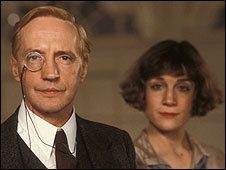 Do you see life as good and worthwhile in itself, or only when you’re fully occupied and happy? I was reminded recently of a conversation embodying that question between two of my favorite fictional characters.
Do you see life as good and worthwhile in itself, or only when you’re fully occupied and happy? I was reminded recently of a conversation embodying that question between two of my favorite fictional characters.
Harriet,” he said, suddenly, “what do you think about life? I mean, do you find it good on the whole? Worth living?”
(He could, at any rate, trust her not to protest, archly: “That’s a nice thing to ask on one’s honeymoon!”)
She turned to him with a quick readiness, as though here was the opportunity to say something she had been wanting to say for a long time:
“Yes! I’ve always felt absolutely certain it was good–if only one could get it straightened out. I’ve hated almost everything that ever happened to me, but I knew all the time it was just things that were wrong, not everything. Even when I felt most awful I never thought of killing myself or wanting to die–only of somehow getting out of the mess and starting again.”
“That’s rather admirable. With me it’s always been the other way round. I can enjoy practically everything that comes along–while it’s happening. Only I have to keep on doing things, because, if I once stop, it all seems a lot of rot and I don’t care a damn if I go west to-morrow. At least, that’s what I should have said. Now–I don’t know. I’m beginning to think there may be something in it after all…
So Peter, who’s had every material luxury he’s ever wanted, been handed every possible privilege, has a hard time staying interested in life. (He did have a hard time during World War I, to be fair. And now that he’s married his viewpoint seems to be changing.) But Harriet, whose father died and who struggled to get into university and spent months in prison thinking she’d be executed for the murder of her lover, finds life worthwhile. Part of the difference between the two characters stems from inborn personality, but part of it comes from their relative hardships, it seems to me. I read somewhere that people who must make great efforts to survive often appreciate life much more than those who have it too easy. Interesting paradox about the human condition, isn’t it?